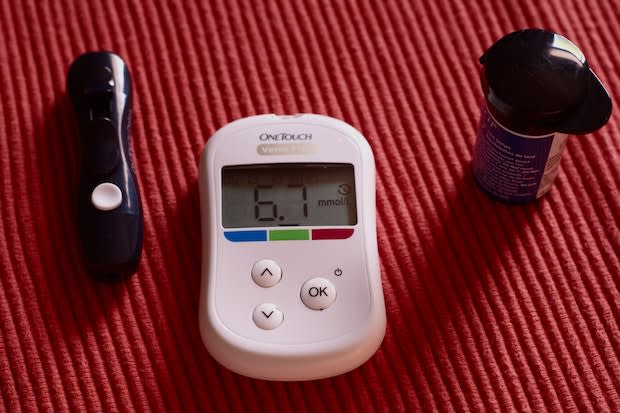Table of Contents
I. Symptoms of Type 2 Diabetes
III. The Importance of Losing Weight
Type 2 diabetes is becoming increasingly common in the United States. Type 2 diabetes is often related to unhealthy diet and lifestyle choices. Over 34 million people in the U.S. have diabetes, most commonly occurring in people over 45. [1] Type 2 diabetes is becoming more and more common in the United States. Type 2 diabetes is often related to unhealthy diet and lifestyle choices. Over 34 million people in the U.S. have diabetes, most commonly occurring in people over the age of 45. [1]
Type 2 occurs when there is a disruption in how the body uses sugar (glucose). Glucose provides the body with energy, but too much sugar can circulate in the bloodstream and lead to problems with the circulatory, nervous, and immune system when glucose cannot be absorbed into the body.
There is no cure, but you can enact several changes in your life to help manage the disease. This disease occurs slowly over time, and if lifestyle changes are not enough to curb your type 2, you may also need medications like Farxiga (dapagliflozin), Glucophage (metformin), and Onglyza. These medications can help regulate your blood sugar levels, but there are several techniques you can do at home as well to improve your condition. But can type 2 diabetes be reversed? Read on to learn more. [2]
As mentioned earlier, symptoms of type 2 diabetes occur over several years. Many people do not realize they are living with type 2 diabetes until symptoms are present. Symptoms may include: There is no fool-proof cure for type 2 diabetes, but you may be able to reverse it with several conscious lifestyle choices. It is an ongoing disease, but you may enter remission if you take your medications and maintain your blood sugar levels in a healthy range. Remission is a healthy place to be, but there is always a chance that type 2 symptoms may come back. Some type 2 patients may not require insulin therapy if they are early in the disease, and it is this phase where diabetes may be reversed. If you are not fully reliant on insulin for glucose regulation, you may be able to avoid health concerns and complications down the road. [3] Shedding extra weight is a huge step towards reversing type 2. If you suddenly lose weight yet do not have type 2, you should seek a doctor's advice. Unintentional weight loss can be a sign of unregulated blood glucose levels, along with several other health conditions. This type of weight loss is not good, but a steady, intentional weight loss routine can have beneficial effects on the heart, blood pressure, and cholesterol levels. A healthy weight is great for the body and can also reduce insulin resistance, making muscle and fat tissues more sensitive to insulin levels in the blood. Excess weight and type 2 diabetes are often related because of diabetes risk factors. A poor diet high in fat, calories, and cholesterol can increase blood glucose spikes and dips. Along with glucose irregularities, you are at an increased risk of fat accumulation. [4] If you are struggling with losing weight through a diet and exercise routine, you may be eligible for bariatric surgery. Bariatric surgery is not available for all overweight people, but for those with a body mass index (BMI) over 35. This surgery is most helpful for those who have had type 2 for five years or less and are not fully reliant on insulin. [3] This surgery encompasses weight loss surgeries that make changes to your digestive system to help you lose weight. Bariatric surgery is usually the last resort. Some of these procedures work by reducing the body's ability to absorb nutrients, so you cannot eat as much and lose weight as a result. Bariatric surgery helps you lose weight, but you must also implement healthy changes to your diet to ensure long-term success. [5] If you are obese, gastric bypass, gastric sleeve, or gastric band surgery may improve or reverse your type 2 diabetes. Researchers estimate that three-quarters of diabetic patients who undergo bariatric surgery reverse their diabetes. [3] Fasting is a diet method used for losing weight. It involves going without food or drink for a certain amount of time. If you would like to try fasting to improve your diabetes, you should talk to your doctor to make sure you do it safely. You may also want to focus on low-carbohydrate meals with fewer calories that may help diabetic patients lose weight and improve insulin absorption. Some research shows that eating few calories (500-600) twice a week and a normal diet the other days of the week helped people with type 2 diabetes lose weight and lower blood sugar levels. Other research has shown that fasting can help diabetic patients get off their type 2 medications and insulin therapy. [3] All in all, there is no one cure for reversing type 2 diabetes, but if you work with your doctor, you can create a healthy diet and exercise routine that may improve your symptoms. It is dangerous to try extreme diet methods without full knowledge of the side effects. Having type 2 diabetes is a serious condition, and you may not be eligible for certain weight loss methods. It is essential not to participate in unproven diet methods that claim to cure diabetes or replace your diabetes medication. You should avoid: The content in this article is intended for informational purposes only. This website does not provide medical advice. In all circumstances, you should always seek the advice of your physician and/or other qualified health professionals(s) for drug, medical condition, or treatment advice. The content provided on this website is not a substitute for professional medical advice, diagnosis, or treatment.
Symptoms of Type 2 Diabetes
Type 2 Diabetes Remission
The Importance of Losing Weight

Bariatric Surgery
Fasting Method

Do Your Research!
